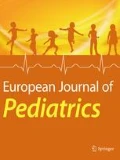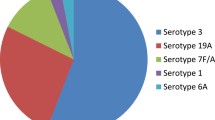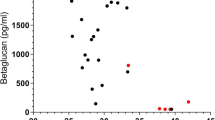Abstract
Pleural effusion is increasingly reported in children. Standard culture of blood or pleural fluid is frequently negative and molecular diagnosis by polymerase chain reaction is not available in all hospitals. The Binax NOW Streptococcus pneumoniae Antigen test (Binax, Portland, USA) is a rapid immunochromatographic test (ICT) for the detection of the C polysaccharide antigen. We evaluated the Binax NOW test on the pleural fluid of 73 children hospitalized with pleural effusion over a period of 4 years. In our sample, the sensitivity and specificity of ICT were high (88% and 71%, respectively), with a positive predictive value of 96%. Detection of the pneumococcal antigen in pleural fluid by ICT is easy and quick, and enables us to identify the pneumococcal origin of the effusion, thus, making the treatment of complicated pneumonia suitably and early.
Similar content being viewed by others
References
Alonso-Tarrés C, Cortés-Lletget C, Casanova T et al (2001) False-positive pneumococcal antigen test in meningitis diagnosis. Lancet 13:1273–1274. doi:10.1016/S0140-6736(01)06368-1
Andreo F, Domínguez J, Ruiz-Manzano J et al (2006) Usefulness of pneumococcal antigen detection in pleural fluid samples by immunochromatographic assay for diagnosis of pneumococcal pneumonia. Clin Microbiol Infect 12:682–684
Charkaluk ML, Kalach N, Mvogo H, Dehecq E et al (2006) Assessment of a rapid urinary antigen detection by an immunochromatographic test for diagnosis of pneumococcal infection in children. Diagn Microbiol Infect Dis 55:89–94
Eastham KM, Freeman R, Kearns AM et al (2004) Clinical features, aetiology and outcome of empyema in children in the Northeast of England. Thorax 59:522–525
Hsieh YC, Hsueh PR, Lu CY et al (2004) Clinical manifestations and molecular epidemiology of necrotizing pneumonia and empyema caused by Streptococcus pneumoniae in children in Taiwan. Clin Infect Dis 38:830–835
Kellog JA, Manzella JP, Bankert DA (2000) Frequency of low-level bacteremia in children from birth to fifteen years of age. J Clin Microbiol 38:2181–2185
Lahti E, Mertsola J, Kontiokari T et al (2006) Pneumolysin polymerase chain reaction for diagnosis of pneumococcal pneumonia and empyema in children. Eur J Clin Microbiol Infect Dis 25:783–789
Le Monnier A, Carbonelle E, Zahar J et al (2006) Microbiological diagnosis of empyema in children: comparative evaluations by culture, polymerase chain reaction, and pneumococcal antigen detection in pleural fluids. Clin Infect Dis 42:1135–1140
Lignt RW (1995) A new classification of parapneumonic effusions and empyema. Chest 108:299–301
Marcos MA, Martínez E, Almela M et al (2001) New rapid antigen test for diagnosis of pneumococcal meningitis. Lancet 357:1499–1500
Murdoch DR, Laing RT, Mills GD et al (2001) Evaluation of a rapid immunochromatographic test for detection of Streptococcus pneumoniae antigen in urine samples from adults with community-acquired pneumonia. J Clin Microbiol 39:3495–3498
Ploton C, Freydiere AM, Benito Y et al (2006) Streptococcus pneumoniae thoracic empyema in children: rapid diagnosis by using the Binax NOW immunochromatographic membrane test in pleural fluids. Pathol Biol 54:498–501
Porcel JM, Ruiz-González A, Falguera M et al (2007) Contribution of a pleural antigen assay (Binax NOW) to diagnosis of pneumococcal pneumonia. Chest 131:1442–1447
Saglani S, Harris KA, Wallis C et al (2005) Empyema: the use of broad range 16 S-rDNA PCR for pathogen detection. Arch Dis Child 90:70–73
Samra Z, Shmuely H, Nahum E et al (2003) Use of the NOW Streptococcus pneumoniae urinary antigen test in cerebrospinal fluid for rapid diagnosis of pneumococcal meningitis. Diagn Microbiol Infect Dis 45:237–240
Schultz KD, Fan LL, Pinsky JJ et al (2004) The changing face of pleural empyema in children: epidemiology and management. Pediatrics 113:1735–1740
Tan TQ, Mason EO Jr, Wald ER et al (2002) Clinical characteristics of children with complicated pneumonia caused by Streptococcus pneumoniae. Pediatrics 110:1–6
The local ethics committee reviewed the study and approved it. Authors reveal that they do not have potential financial or ethical conflicts of interest regarding the contents of the submission.
Author information
Authors and Affiliations
Corresponding author
Rights and permissions
About this article
Cite this article
Casado Flores, J., Nieto Moro, M., Berrón, S. et al. Usefulness of pneumococcal antigen detection in pleural effusion for the rapid diagnosis of infection by Streptococcus pneumoniae . Eur J Pediatr 169, 581–584 (2010). https://doi.org/10.1007/s00431-009-1077-y
Received:
Revised:
Accepted:
Published:
Issue Date:
DOI: https://doi.org/10.1007/s00431-009-1077-y




